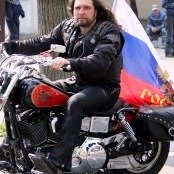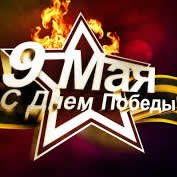Russian soft power has a new face: biker Alexander Zaldostanov, aka “The Surgeon.” The widely publicized tour of his Night Wolves motorcycle club, with all its carnivalesque and pretentious absurdity through parts of Europe on the eve of Victory Day, shines a light on some of the contradictions of current Kremlin ideology.
One, Italian philosopher Giorgio Agamben’s question “Who speaks on behalf of the dead?” is strikingly acute in today’s Russia — particularly against the backdrop of Zaldostanov’s “patriotic” road-trip. Nothing could be further from the habitus of the old generation of war heroes than the subculture of noisy and unruly motorcycle riders who pretend to speak on their behalf. There is no sign of any Russian veteran being publicly supportive of Zaldostanov’s 2014 appeal to go to war with Ukraine under the purely imaginative pretext of “fighting fascism.” In fact, the Night Wolves simply appropriated the glory of their predecessors, politicized it, and interpreted it in accordance with the prescriptions of their financial sponsors in the Kremlin.
Two, though the Night Wolves clearly dislike “unfriendly” Europe, they have been trying hard to enter it, though even not getting in is worth headlines. When Poland and Germany refused entry to some of the group’s members, the club said they will hire a German lawyer to probe the legality of the denials. They also said they want to register Night Wolves branches in European countries. With its liberalism, Europe is certainly a prime target for the “mission” of the Wolves. The Kremlin-Wolves show makes clear that in spite of their collective verbal repugnance of European values, and for all the talk of Russia’s U-turn toward the East (China), Russia does not intend to leave Europe alone. In fact, Russia seeks to permeate its borders, impose its own mode of communication, and inflict its intolerances upon Europe.
Three, the buffoonery staged by the motorcyclists illuminates how deeply Russia might transmogrify Western cultural and social discourses. The subculture of motorcycle clubs, born in the United States more than a century ago, and rooted in the radical rejection of authority, has miraculously become the epitome of Russian national authenticity and a symbol of patriotism. Soft power, a concept designed for describing the spillover of liberal values across the globe, is now used for its direct opposite: the propaganda of Stalinism by warmongers.
Finally, semantic connotations do matter. Zaldostanov's nickname, “The Surgeon,” nicely reflects the biopolitical core of the Kremlin's attitude toward Europe as an ill patient who needs “treatment.”
Does anybody still believe that Russia is only trying to defend itself?











